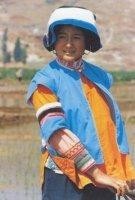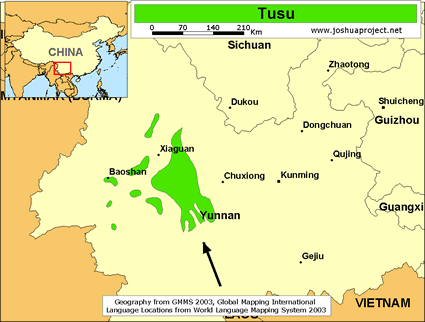The Tusu actually call themselves Tu, but in Operation China their alternate name is used to avoid confusion with the official Tu nationality of Qinghai Province. The Chinese refer to many tribal peoples as Tu or Tuzu. As Jamin Pelkey explains, "In Chinese tu means 'dirt' or 'native' and turen means 'natives' or 'aborigines'. Nevertheless, this people actually refer to themselves as Tusu (Tu people) in their own language - that is to say, Tu is their autonym. This people began to call itself Tu in the seventh century AD."
For more than 1,300 years the Tusu have appeared in Chinese records of Yunnan Province. The Tusu "are said to be descendants of the ancient Muocha tribe which moved from Baoshan to Weishan in ancient times. In the seventh century AD they moved to present-day Xiangyun County and later spread into southeastern Dayao and parts of Binchuan County."
In some areas the Tusu love to come together and participate in local festivals, since it gives them a chance to relax and forget about their hardships and struggles. The festivals also serve as a reunion for relatives and friends. The Tiger Dance Festival is held for one week during the first lunar month each year. Large feasts are held, and tribesmen take the opportunity to trade with each other.
At another time of the year the Tusu indulge in ceremonial washing and bathing, which represents a cleansing from sin for the past year's transgressions. Houses are also thoroughly cleaned out as the people bid to start the upcoming year afresh. They also eat glutinous rice, dance, sing, and get drunk. Polytheism (the worship of many gods), animism (spirit appeasement), and ancestor worship are the three main religions among the Tusu people.
The status of Christianity among the Tusu is uncertain, but there are believed to be about 20 Catholic believers in Binchuan County. There are a number of Han Chinese and Bai churches in the area, but most of the people do not really understand the gospel. Many others have no awareness of the existence of Christianity at all.
The Tusu people need to accept the warm embrace of the only Savior so they can enjoy spiritually meaningful lives.
Pray for the authority of Christ to bind hindering spiritual forces to lead them from darkness to light.
Pray for signs and wonders to happen among them and for great breakthroughs with a rapid multiplication of disciples and house churches.
Pray for bold workers who are driven by the love of the Holy Spirit to go to them.
Pray for an unstoppable movement to Christ among them.
Scripture Prayers for the Tusu in China.
Operation China, Asia Harvest, Copyrighted © Used with permission
| Profile Source: Joshua Project |











